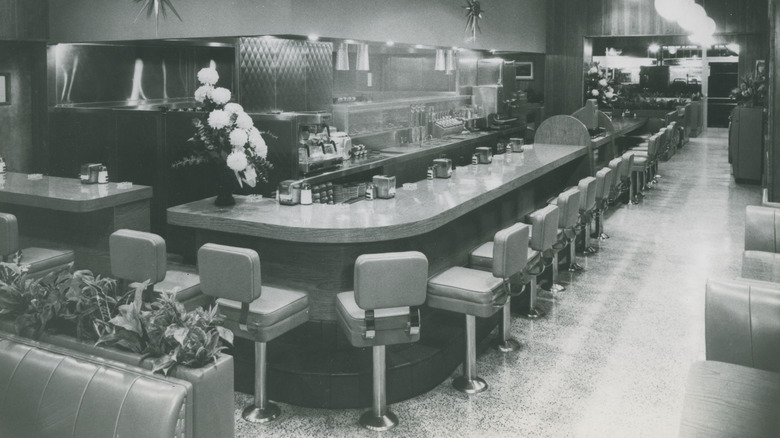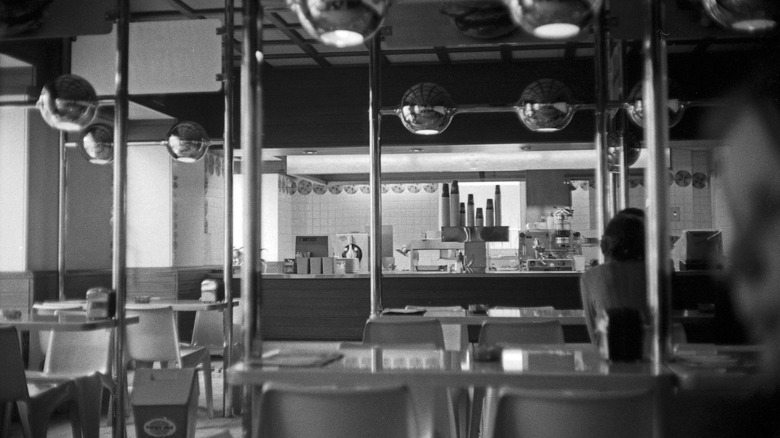Disturbing Details Of The Unsolved Burger Chef Murders Crime Scene
Hardly any young people are thrilled by their first job. A fair few are also rebellious. So when four young employees of Speedway, Indiana's Burger Chef disappeared in November 1978 along with $581 in cash, police initially surmised that it was a case of petty theft committed for a joyride. They allowed the restaurant to be cleaned and opened for business the next day and assumed the missing employees would turn up soon. But when they were found two days later, it was evident that a much darker scenario had played out — all four employees were murdered and left in the woods.
In no small part due to the initial lax attitude of investigators, the Burger Chef murders, as they've come to be known, remain unsolved to this day. Dedicated local and state police tried to pick up the trail, and promising leads opened up in the years after the killings. With each potential breakthrough, however, something came along to derail the investigation anew. Sordid backgrounds and other hideous crimes came to light through looking at various suspects, one of whom may well have been responsible for the murders. And true crime aficionados have brought more information about the case into the public eye, and a fresh look at the grim sites associated with the murder. Though all this attention hasn't answered the key questions: Who killed the employees, and why?
A prime suspect knew intimate details of the murder site
The four victims of the Burger Chef murders were 16-year old Daniel Davis and Mark Flemmonds, 17-year-old Ruth Ellen Shelton, and 20-year-old Jayne Friedt, who was the assistant manager of the restaurant. Per Indianapolis Monthly, Shelton and Davis, were killed by shots from a .38-caliber gun to the back of the head. Friedt and Flemmonds, it seemed, tried to flee, though neither got very far. Flemmonds suffered blows to the head from a chain and was left to choke on his own blood. Friedt died of two stabs from a hunting knife. The blade was still embedded in her chest; the handle, broken off, was missing.
This detail about the knife handle wasn't publicized at the time. So the fact that Donald Forrester, a convicted rapist, knew about it was of grave interest to investigators. Forrester mentioned the handle when he confessed to the killings in 1986 after having already been a person of interest in the case. When detectives drove him out to Speedway, he knew where in the woods the murders had taken place and correctly placed all the bodies. His ex-wife was able to lead authorities to .38-caliber shell casings Forrester had flushed down the toilet of their house.
But for all his intimate knowledge of the scene of the crime, Forrester's confession was not an airtight accounting for the Burger Chef murders. He recanted, confessed again, and recanted once more before his death in 2006. While some remain convinced of his guilt, state trooper Jim Cramer told Business Insider that he's sure as he can be that it was all lies.
Threatening phone calls had been made to the restaurant
The Burger Chef itself was of no value to the authorities within hours of the disappearances. Any forensic evidence that might have been salvaged was lost when the restaurant got the all-clear to clean up and open shop, a mishandling of a crime scene disturbing in and of itself. But in 2023, a four-year-old Freedom of Information Act request by Kevin Greenlee of the "Murder Sheet" podcast bore fruit when the FBI provided a redacted file on the Burger Chef murders. Among its contents were new details about the Burger Chef that coincided with past confessions.
Donald Forrester had claimed that the Burger Chef murders were an act of intimidation gone wrong. He said he was part of a drug gang owed money by Jayne Friedt's brother, and they wanted to threaten her to get to him. The FBI report included records of Friedt receiving threatening phone calls for weeks before her murder. It also described how several employees had been fired shortly before the incident, possibly due to drug use. Another employee, due to be fired, was a no-show for work the night of the killings; he had gotten into trouble with Friedt before.
Other details in the FBI report, such as eyewitness accounts of two men at Burger Chef that night, align with details from an account by James Pruitt, an eyewitness who identified two young men as the murderers before walking back his claims. But both Pruitt's and Forrester's stories remain recanted and unproven. The Burger Chef has since been scheduled for demolition, and despite ongoing efforts, the murder case remains cold.


